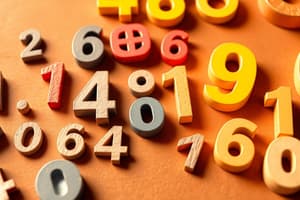Podcast
Questions and Answers
What is the cornerstone of math?
What is the cornerstone of math?
- Operations
- Numbers (correct)
- Fractions
- Properties
Which operation is governed by the commutative property?
Which operation is governed by the commutative property?
- Division
- Subtraction
- Addition (correct)
- Multiplication
What concept allows us to perform calculations in a consistent manner?
What concept allows us to perform calculations in a consistent manner?
- Decimals
- Fractions
- Algebra
- Properties (correct)
Which type of number paves the way for advanced concepts like algebra and calculus?
Which type of number paves the way for advanced concepts like algebra and calculus?
What property states that \((a + b) + c = a + (b + c)\)?
What property states that \((a + b) + c = a + (b + c)\)?
What operation follows understanding numbers in the hierarchy of learning math concepts?
What operation follows understanding numbers in the hierarchy of learning math concepts?
What is the main focus of algebra?
What is the main focus of algebra?
Which branch of math deals with the study of shape and space?
Which branch of math deals with the study of shape and space?
How does math play a role in everyday life situations?
How does math play a role in everyday life situations?
What provides structure and order to help artists create and analyze their work?
What provides structure and order to help artists create and analyze their work?
Which field relies on math as a tool for problem-solving and analysis?
Which field relies on math as a tool for problem-solving and analysis?
What does mastering the core concepts of math enable individuals to do?
What does mastering the core concepts of math enable individuals to do?
Study Notes
Math: A Foundation for Understanding the World
Math is a universal language that helps us to make sense of the world around us. It's a collection of concepts, principles, and techniques that enable us to solve problems, analyze data, and make informed decisions in various aspects of life. In this article, we'll delve into the fundamentals of math, exploring its core building blocks and their real-world applications.
Numbers
Numbers are the cornerstone of math. They represent quantities and provide a framework for performing arithmetic operations like addition, subtraction, multiplication, and division. We're introduced to numbers early on, starting with whole numbers and progressing to integers, fractions, decimals, and rational and irrational numbers. These are the foundational blocks that pave the way for more advanced concepts such as algebra and calculus.
Operations and Properties
Once we understand numbers, we move on to operations like addition, subtraction, multiplication, and division. These operations are governed by a set of properties that allow us to perform calculations in a consistent and predictable manner. For instance, the commutative property of addition states that (a + b = b + a), while the associative property states that ((a + b) + c = a + (b + c)). These properties, and others like them, are essential to our understanding of math and our ability to solve problems and reason logically.
Algebra
Algebra is a branch of math that focuses on solving equations and relationships between variables. In algebra, we learn how to represent and manipulate unknowns, as well as explore the behavior of quantities in a variety of contexts. Through algebra, we are able to solve complex problems and make predictions based on patterns and relationships.
Geometry
Geometry is the branch of math that focuses on the study of shape and space. It includes concepts like area, perimeter, volume, and angles, as well as the properties of shapes and figures like lines, circles, triangles, and squares. In geometry, we learn about the relationships between shapes and how to calculate their properties, as well as how to use their properties to solve problems.
Applications
Math has a wide range of real-world applications. For instance, it's used in everyday life situations, such as understanding the cost of a purchase or calculating a tip at a restaurant. Math is also crucial in fields like engineering, physics, and economics, where it serves as a tool for problem-solving, analysis, design, and optimization. Math even plays a role in the arts, where it provides structure and order to help artists create and analyze their work.
Conclusion
Math is an essential tool for navigating the world around us. It provides a framework for understanding the relationships between quantities, shapes, and spatial relations, and it serves as a tool for problem-solving, analysis, and optimization in a wide range of fields. By mastering the core concepts of math, we open up a world of possibilities for ourselves, enabling us to tackle complex challenges and make informed decisions. So, whether you're a student, a professional, or simply someone who wants to be better equipped to handle the complexities of the world around you, investing time and effort in mastering math is undoubtedly a wise choice.
Studying That Suits You
Use AI to generate personalized quizzes and flashcards to suit your learning preferences.
Description
Delve into the core concepts of math including numbers, operations, algebra, geometry, and real-world applications. Learn about the foundational blocks that pave the way for advanced mathematical concepts and gain a better understanding of how math is a universal language used for problem-solving and decision-making in various fields.




